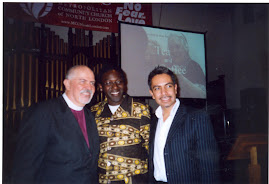
UPR: Angola
International Lesbian and Gay Association (European Region)
United Nations Human Rights Council, Geneva. 10th June 2010.
Presented by Rowland Jide Macaulay
Mr. President, distinguished members of the delegation,
We wish to address recommendations 98 and 99, issues of serious concern raised in the Working Group report on Angola. This provision calls for the amendment of the penal code and other discriminatory laws that may affect Lesbian, Gay, Bisexual and Transgender citizens of Angola and also measures to decriminalize consensual sexual activity among person of the same sex, to ensure that no one is punished under these laws.
Recommendations 98 & 99 is unrelated to marriage in general. Criminalisation of same sex is a violation of established international human rights law and a major blow to public health. It raises serious issues of discrimination and jeopardises the important struggle against HIV/AIDS. The Human Rights Committee has noted that laws criminalising homosexuality “run counter to the implementation of effective education programmes in respect of HIV/AIDS prevention” by driving marginalised communities underground, a finding supported by UNAIDS and other key actors in the fight against the HIV/AIDS pandemic.
In Toonen v Australia 1994, the UN Human Rights Committee has confirmed that laws against consensual same-sex conduct violate the rights to both privacy and non-discrimination, contrary to articles 17(1) and 26 of the International Covenant on Civil and Political Rights.
The UN Secretary General Ban Ki Moon in a recent statement, said “We cannot stay quiet when people are denied fundamental rights, whatever their race or faith or age or gender or sexual orientation. It is unfortunate that laws that criminalise people on the basis of their sexual orientation exist in some countries. They should be reformed.”.
We urge the government of Angola to:
• urgently repeal discriminatory laws, in particular articles 70 and 71 of the Penal Code and legally reinforce security for LGBTI people and the full protection of human rights for LGBT people.
• address underlying stereotypes and discrimination through education programs and community dialogue, to help create a more supportive environment for LGBTI persons.
• promote media training, explicitly designed to discourage attitudes of discrimination, incitement to violence and stigmatisation, especially in respect of HIV/AIDS.
Thank you Mr. President.




No comments:
Post a Comment